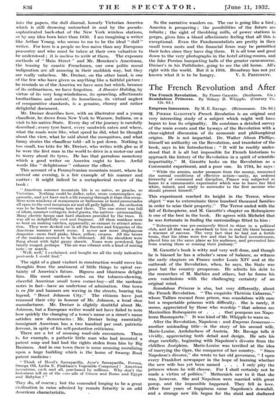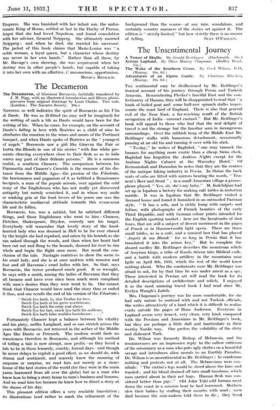The French Revolution and After
Empress Innocence. By M. E. Ravage. (Heinemann. 12,s. 6d.) M. PIERRE GAXOTTE'S French Revolution is an original and very interesting study of a subject which might well have begun to lose its originality. Ile combines a detailed survey of the main events and the byways of the Revolution with a clear-sighted discussion of its economic and philosOphical origins. He is not impartial. Dr. Walter Alison Phillips. himself an authority on the Revolution, and translator of the book, says in his Introduction : "It will be readily under- stood that it is all but impossible for French historians to approach the history of the Revolution in a spirit of scientific impartiality." M. Gaxotte looks on the Revolution as a Communist experiment, and a poor one. In 1794, he -says : "While the armies, under pressure from the enemy, recovered the normal conditions of effective action—unity, an ordered hierarchy of command and discipline, France was subjected at home to a communistic experiment which was to leave her bled white, ruined, and ready to surrender to the first saviour who should present himself."
This experiment reached its height in the Terror, whose Object "was to exterminate three hundred thousand families in order to seize their property." The Terror ended with the fall of Robespierre, and M. Gaxotte's chapter on Robespierre is one of the best in the book. He agrees with Michelet that he was fortunate in finding the surroundings fitted to him :
" Robespierre was pre-eminently fitted to shine in a political club, and all that was a drawback to him in real life there became a warrant of success. The very fact that he had not a. fertile brain, that his ideas were few and that he lacked inventiveness, placed him on the same plane as his audience, and prevented him from scaring them or rousing their jealousy."
M. Gaxotte's book is witty and very well done, and though he is biassed he has a scholar's sense of balance, as witness the early chapters on France under Louis XIV and at the outbreak of the Revolution, when, he says, the State was poor but the country prosperous. He admits his debt to the researches of M. Mathiez and others, but he forms his own conclusions with the challenging certainty of an original mind.
Scandalous Princess is also, but very differently, about the French Revolution. "The exquisite Theresia Cabarrus," whom Tallien rescued from prison, was scandalous with ease but a respectable princess with difficulty. She is rarely, it seems, appreciated by those who worship "that solemn ass Maximilien Robespierre or . . . that pompous ass Napo- leone Buonaparte." It was kind of Mr. Whipple to warn us.
After the Revolution, Napoleon : and Empress Innocence— another misleading title—is the story of his second wife, Marie-Louise, Archduchess of Austria. Mr. Ravage tells it vividly, appreciating both detail and design. He sets his stage carefully, beginning with Napoleon's divorce from the childless Josephine. Marie-Louise was terrified at the idea of marrying the Ogre, the conqueror of her country. "Since Napoleon's divorce," she wrote to her old governess, "I open every Frankfort newspaper in the hope of learning whether the new wife has yet been named . . . I only pity the princess whom he will choose. For I shall certainly not be made a victim of politics." Metternich saw to it that she was, however. She and Napoleon were married with great pomp, and the impossible happened. They fell in love. After four years of happiness came Napoleon's downfall, and a strange new life began for the staid and sheltered Empress. She was banished with her infant son, the unfor- tunate King of Rome, settled at last in the Duchy of Parma, forgot that she had loved Napoleon, and found consolation with her adviser, General Neipperg. She ultimately married Neipperg : and when he died, she married his successor. The jacket of this book claims that Marie-Louise was a noble woman, a loyal queen, but a character whose destiny was never in her own hands." Rather than all these, by Mr. Ravage's own showing, she was acquiescent when her destiny was in other people's hands, but capable of taking it into her own with an effective, i: unconscious, opportunism.
MONICA REDLICH.



































 Previous page
Previous page